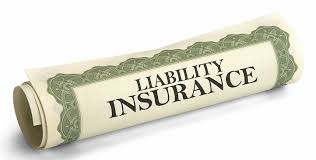Liability insurance Dictionary

Liability insurance, one of the types of liability insurance, refers to the responsibility for economic compensation that the insured causes bodily injury and property to third parties due to his own fault, negligence, etc. Insurance taken out by the insurer. In automobile liability insurance, this means that the insured or his authorized driver has an accident while using the insurance vehicle, causing third parties personal injury or direct damage to property, which should be borne by the insured in accordance with the law. Financial responsibility, insurance companies are responsible for compensation. At the same time, if the insured incurs arbitration or litigation costs due to the written consent of the insurance company, the insurance company will indemnify outside the limit of liability, but the maximum amount will not exceed not 30% of the liability limit.
basic concept
Liability insurance : the insured vehicle suffers personal injury or the death or direct loss of property due to an accident, and the insurer pays compensation in accordance with the provisions of the insurance contract. Liability insurance implements compulsory insurance. In some types of insurance, certain third parties are treated as exclusions for losses caused by accidents caused by insurance vehicles. Even if these victims are third parties, even if they are damaged by a traffic accident, and even if the insured assumes civil liability, the insurance company will not be liable for this part of the indemnity. insurance. For example, in liability insurance, private cars and personal vehicles under contract are not insured if they cause personal or property losses to members of the insured's family, or loss of personal property of any person in insured vehicle, etc. As part of the compensation.
In the past, the vast majority of local governments have listed liability insurance as a type of compulsory insurance. Without this insurance, motor vehicles cannot be registered and cannot be inspected every year.
Since the compulsory insurance pays the damage to property and the medical costs of the third party in part relatively low, it can be considered to subscribe a civil liability insurance in addition to the compulsory insurance.
Insurance obligation
1. Qualified drivers authorized by the insured: There are two meanings here: the driver authorized by the insured, who refers to the insured, his spouse and members of their immediate family or employees of the insured holders of a driving license, Or the driver uses the insurance vehicle during the work assigned by the insured, or the insured has a commercial rental relationship with the driver using the insurance vehicle. The second is qualified, which means that the above driver must hold a valid driver's license and that the vehicle being driven conforms to the category of near-driving specified in the driver's license. Only drivers who have both "authorized" and "qualified" conditions in the insurance vehicle will be compensated by the insured in the event of a claim due to an insurance accident. If the insurance vehicle is driven by a private person, or if the driver promises to drive without the consent of the owner or manager of the unit to which the insurance vehicle belongs, the driver cannot be considered a "driver authorized by the insured" to drive. , The insurer will not compensate.
Second, the process of using insurance vehicles: the whole process in which insurance vehicles are used as a tool, including driving and parking. For example, an insurance crane can perform the lifting operation after fixing its wheels, which can be called "the process of using an insurance vehicle".
3. Third party: In the insurance contract, the insurer is the first party, also called the first party; the insured or the victim is the second party, also called the second party; except the insurer and the insured In addition, the victim who has suffered bodily injury or loss of property due to an accident in an insurance vehicle is a third party, also called a third party.
4. Injury or death: the body is injured or life is over.
V. Direct damage: an accident occurred in the insurance vehicle, which directly caused real damage to the existing property of others at the accident site.
6. The amount of compensation that should be paid by the insured in accordance with the law: According to the regulations relating to management n traffic accidents and applicable laws and regulations, the amount of compensation payable depending on the liability in the event of an accident assumed by the insured or his qualified drivers.
7. The insurer indemnifies in accordance with the provisions of the insurance contract:
1. The provisions of the insurance contract: refer to basic insurance clauses, additional insurance clauses, special agreements and relevant provisions contained in insurance documents such as insurance approvals.
2. The insurer is not unconditionally fully liable for the "amount of compensation that the insured should pay in accordance with the law", and the non-compensatory part specified in the insurance contract should also be deleted during claims .



